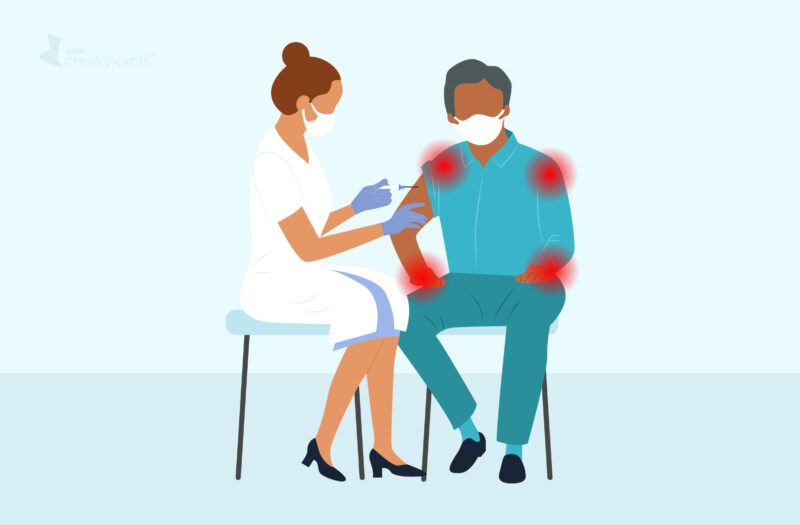Learn more about our FREE COVID-19 Patient Support Program for chronic illness patients and their loved ones.
If you have a weakened immune system, you have a higher risk of severe COVID-19 illness — and you may not have a robust immune response to COVID-19 vaccination. Because of that, you’ve probably already taken every step you can to protect yourself throughout the pandemic, which includes staying up to date on your vaccination and booster series.
However, you may be surprised to know that if you’ve already received an additional dose and a booster (four doses of the COVID-19 vaccine total), it may be time for you to get a fifth dose.
The U.S. Centers for Disease Control and Prevention (CDC) notes that people ages 12 years and older who are moderately or severely immunocompromised should receive a total of five doses of an mRNA COVID-19 vaccine to stay up to date. Those five doses include the primary series of three doses recommended for these individuals, plus two boosters.
This guidance does not apply to the general population, for which only one booster is currently recommended (though two boosters can be given to those over age 50), per the CDC.
“The immunocompromised have to think of themselves in a different category and need to stay up to date with their vaccines,” says infectious disease physician Amesh A. Adalja, MD, a Senior Scholar at Johns Hopkins Center for Health Security.
Your Dosing Timing
Here’s what your dosing timing may look like for Pfizer and Moderna:
Primary Series
- First dose: Get your first vaccination as soon as you can, if you haven’t already
- Second dose: Three weeks (21 days) after first dose for Pfizer; four weeks (28 days) after first dose for Moderna
- Third dose: At least four weeks (28 days) after second dose
Booster Series
- Fourth dose (first booster): At least three months after third dose
- Fifth dose (second booster): At least four months after fourth dose
Note that only the Pfizer vaccine is available for teens ages 12 to 17.
People ages 18 and older who are moderately or severely immunocompromised and received the one-dose Johnson & Johnson COVID-19 vaccine should get a second dose of either mRNA COVID-19 vaccine, plus two mRNA coVID-19 vaccine boosters (for a total of four doses).
In this case, the second dose would be given at least 28 days after the first dose, the first booster would be given at least two months after the second dose, and the second booster would be given at least four months after the third dose.
If you need help determining when you can get boosters, use the CDC’s COVID-19 booster tool or talk to your doctor.
There are several scenarios in which someone may be considered to be moderately or severely immunocompromised due to certain types of conditions and treatments, per the CDC. Examples might include those who have:
- Active treatment with high-dose corticosteroids or other drugs that may suppress the immune response
- Been receiving active cancer treatment for tumors or cancers of the blood
- Received an organ transplant and are taking medicine to suppress the immune system
- Received a stem cell transplant within the last two years
- Moderate or severe primary immunodeficiency (such as DiGeorge syndrome or Wiskott-Aldrich syndrome)
- Advanced or untreated HIV infection
Will I Keep On Needing Boosters?
Whether or not immunocompromised patients will need to continue getting boosters in three- to four-month intervals into the future depends on vaccine technology.
“When it comes to current vaccines directed against the ancestral strain of the virus, the original strain, it appears that this type of frequency is necessary to protect the immunocompromised,” says Dr. Adalja. “That may change when there’s an updated vaccine that’s more durable or when a different type of technology exists for immunocompromised populations.”
For now, if you’re immunocompromised, make sure you’re up to date on all of your COVID-19 vaccine doses (including the fifth dose) — and talk to your doctor about treatments like Evusheld, a monoclonal antibody drug to prevent COVID-19 in the immunocompromised.
Get Free Coronavirus Support for Chronic Illness Patients
Join the Global Healthy Living Foundation’s free COVID-19 Support Program for chronic illness patients and their families. We will be providing updated information, community support, and other resources tailored specifically to your health and safety. Join now.
If you enjoyed reading this article, you’ll love what our video has to offer.
COVID-19 Vaccines for People who are Moderately or Severely Immunocompromised. COVID-19. U.S. Centers for Disease Control and Prevention. June 19, 2022. https://www.cdc.gov/coronavirus/2019-ncov/vaccines/recommendations/immuno.html.
COVID-19 Vaccine Boosters. COVID-19. U.S. Centers for Disease Control and Prevention. June 19, 2022. https://www.cdc.gov/coronavirus/2019-ncov/vaccines/booster-shot.html.
Interview with infectious disease physician Amesh A. Adalja, MD, a Senior Scholar at Johns Hopkins Center for Health Security.






